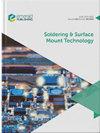电子封装用掺钬共晶Sn-Ag无铅焊料的研制
IF 1.8
4区 材料科学
Q3 ENGINEERING, ELECTRICAL & ELECTRONIC
引用次数: 4
摘要
目的本研究旨在总结微量添加Ho-REE对高性能应用的二元Sn-Ag焊料合金的结构、机械强度和热稳定性的影响。设计/方法/方法本研究研究了少量添加钬对环境友好的共晶熔喷工艺Sn–Ag焊料合金的微观结构、热稳定性、机械性能和润湿性的影响。采用动态共振技术、X射线衍射(XRD)和扫描电子显微镜研究了焊料的硬度、相识别和形貌特征。结构和微观结构分析表明,除正交IMC-Ag3Sn相分散在Sn基体中外,还存在菱形的ß-Sn相。此外,研究结果表明,基于活性RE元素的吸附作用,在Sn-Ag体系中添加少量的Ho稀土可以降低和改善菱面体ß-Sn和正交IMC-Ag3Sn的粒度。Ho在晶界的吸附使Ag3Sn更均匀地呈针状分布在ß-Sn基体中。微细均匀的微观结构提高了机械强度。显微组织的细化是由于IMC-Ag3Sn晶粒具有较高的表面自由能,防止了位错滑移。这可能会提高微观硬度和微观蠕变,从而延迟焊料的断裂点。与普通焊料相比,添加Ho(RE)可以分别提高熔化温度215°C和接触角31°C。结果表明,添加微量Ho元素是增强新型焊点的有效方法。研究了稀土元素Ho颗粒对共晶Sn-3.5Ag钎料合金组织和力学性能的影响。微观结构研究表明,在共晶Sn-3.5Ag中加入Ho颗粒抑制了晶粒尺寸的减小和细化,Ag3Sn IMC增强了普通焊料合金的强度。与普通焊料相比,添加微量Ho颗粒可以显著提高Sn-3.5Ag焊料合金的杨氏模量、维氏显微硬度等力学性能,这是因为存在更细、更高体积分数的Ag3SnIMC。这些变化可以通过考虑塑性变形来理解。Sn-3.5Ag-Ho焊料合金的强化机制可以用Ho硬化颗粒和更细的IMC来解释,它们分布在共晶区内,因为它们充当钉扎中心,抑制了集中在晶界周围的位错的迁移率。结果表明,与普通焊料相比,添加Ho 0.5可获得最佳的抗蠕变性能。在Sn-3.5Ag无铅焊料合金中添加Ho,使合金的熔化温度降低了几度。独创性/价值电子封装用掺钬共晶Sn-Ag无铅焊料的开发。本文章由计算机程序翻译,如有差异,请以英文原文为准。
Development of holmium doped eutectic Sn-Ag lead-free solder for electronic packaging
Purpose
This study aims to summarize the effects of minor addition of Ho REE on the structure, mechanical strength and thermal stability of binary Sn- Ag solder alloys for high-performance applications.
Design/methodology/approach
This study investigates the effect of a small amount of holmium addition on the microstructure, thermal stability, mechanical behaviour and wettability of environmentally friendly eutectic melt-spun process Sn – Ag solder alloys. Dynamic resonance technique, X-ray diffraction (XRD) and scanning electron microscopy were carried to study stiffness, identification of the phases and the morphology features of the solder. Structure and microstructure analysis indicated that presence of rhombohedral ß-Sn phase in addition to orthorhombic IMC Ag3Sn phase dispersed in Sn-matrix. Also, the results showed that Ho rare earth addition at a small trace amount into Sn-Ag system reduces and improves the particle size of both rhombohedral ß-Sn and orthorhombic IMC Ag3Sn based on the adsorption effect of the active RE element. The adsorption of Ho at grain boundaries resulted in Ag3Sn more uniform needle-like which is distributed in the ß-Sn matrix. The fine and uniform microstructure leads to improvement of mechanical strength. The microstructure refinement is due to the high surface free energy of IMC Ag3Sn grains, and it prevents the dislocation slipping. This maybe enhance the micro-hardness and micro-creep hence delays the breaking point of the solder. Ho (RE) trace addition could enhance the melting temperature and contact angle up to 215°C and 31°, Respectively, compared with plain solder. All results showed that Ho trace addition element has an effective method to enhance new solder joints.
Findings
Effect of rare earth element Ho particles on the microstructure and mechanical behavior of eutectic Sn-3.5Ag solder alloy was studied. Some important conclusions are summarized in the following: microstructure investigations revealed that the addition of Ho particles to eutectic Sn-3.5Ag inhibited in reducing and refines the crystallite size as well as the Ag3Sn IMC which reinforced the strength of plain solder alloy. The mechanical properties values such as Young’s modulus, Vickers microhardness of Sn-3.5Ag solder alloy can be significantly improved by adding a trace amount of Ho particles compared with plain solder due to the existence of finer and higher volume fraction of Ag3SnIMC. These variations can be understood by considering the plastic deformation. The strengthening mechanism of the Sn-3.5Ag-Ho solder alloy could be explained in terms of Ho harden particles and finer IMC, which are distributed within eutectic regions because they act as pinning centres which inhibited the mobility of dislocation that concentrated around the grain boundaries. The results show that the best creep resistance is obtained when the addition of Ho 0.5 is compared to plain solder. The addition of Ho on Sn-3.5Ag lead-free solder alloy decreases the melting temperature to few degrees.
Originality/value
Development of holmium-doped eutectic Sn-Ag lead-free solder for electronic packaging.
求助全文
通过发布文献求助,成功后即可免费获取论文全文。
去求助
来源期刊

Soldering & Surface Mount Technology
工程技术-材料科学:综合
CiteScore
4.10
自引率
15.00%
发文量
30
审稿时长
>12 weeks
期刊介绍:
Soldering & Surface Mount Technology seeks to make an important contribution to the advancement of research and application within the technical body of knowledge and expertise in this vital area. Soldering & Surface Mount Technology compliments its sister publications; Circuit World and Microelectronics International.
The journal covers all aspects of SMT from alloys, pastes and fluxes, to reliability and environmental effects, and is currently providing an important dissemination route for new knowledge on lead-free solders and processes. The journal comprises a multidisciplinary study of the key materials and technologies used to assemble state of the art functional electronic devices. The key focus is on assembling devices and interconnecting components via soldering, whilst also embracing a broad range of related approaches.
 求助内容:
求助内容: 应助结果提醒方式:
应助结果提醒方式:


